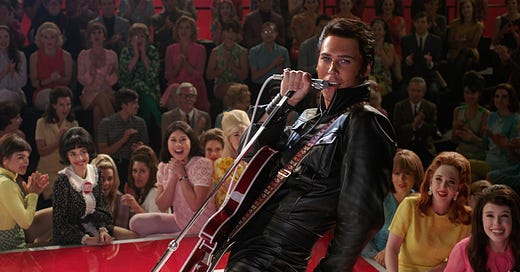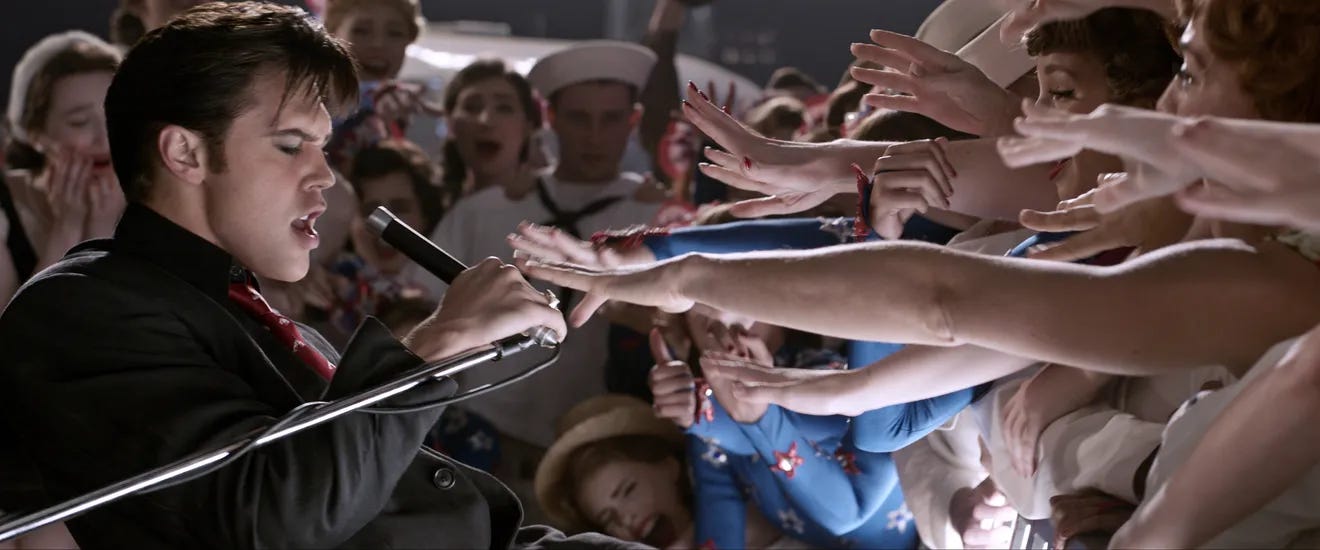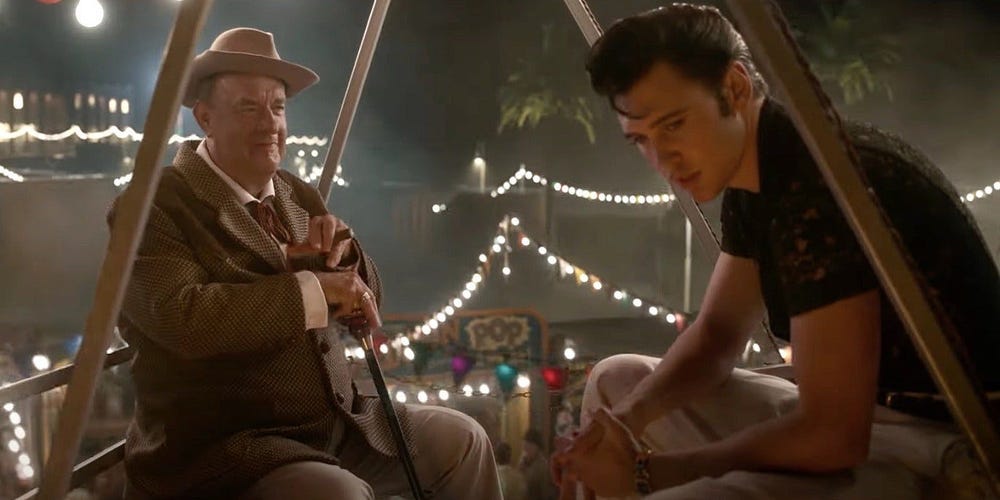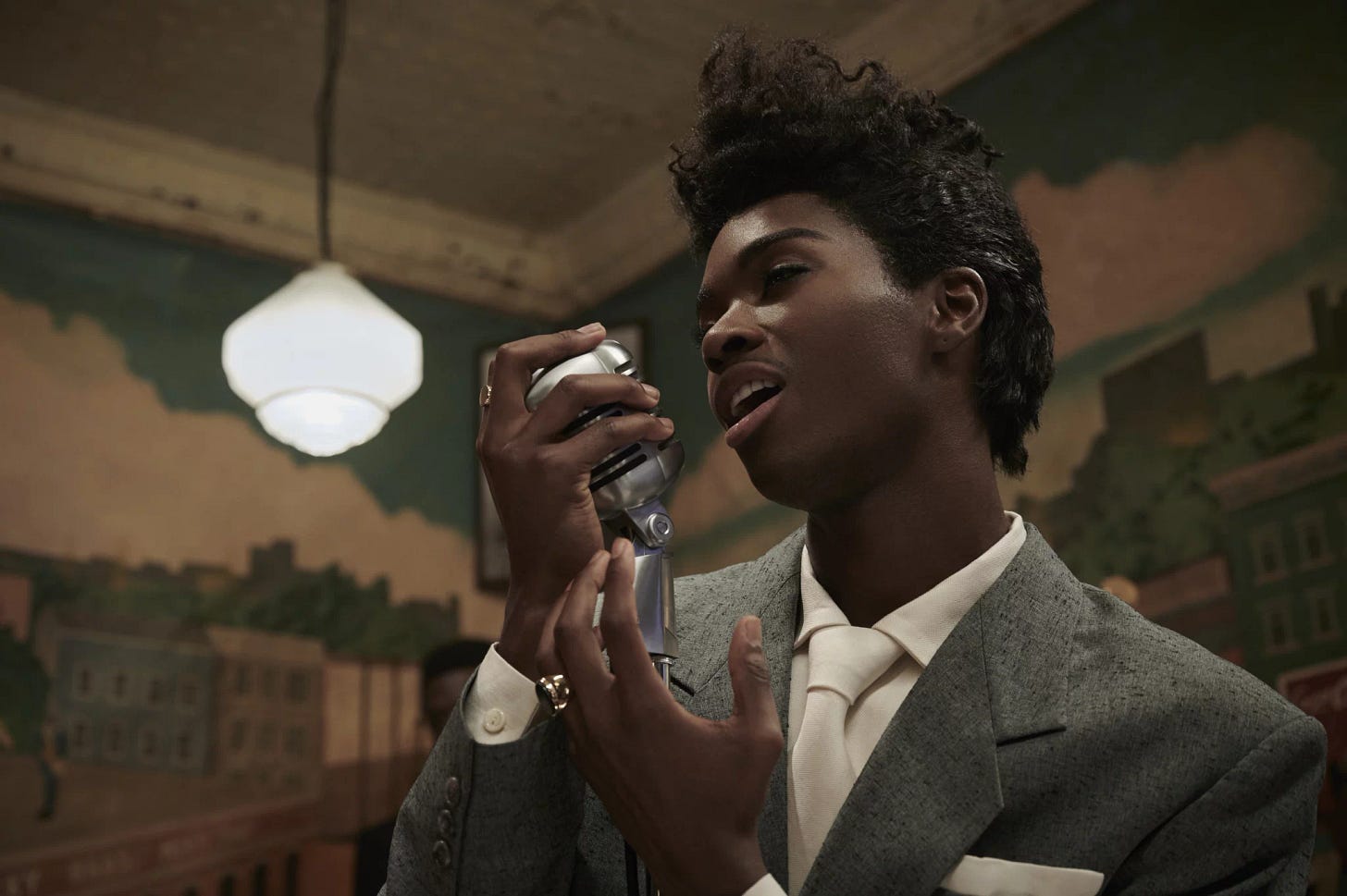All Shook Up
"Elvis" re-enters the building in Baz Luhrmann's kaleidoscopic biopic, a movie dedicated to the proposition that more isn't nearly enough.
The Nut Graf: Baz Luhrmann turns the life of Elvis Aaron Presley into a three-ring circus with more sensation than sense in “Elvis” (in theaters, **1/2 stars out of ****). But it’s got a good beat and you can dance to it.
If you were a late Boomer hitting adolescence at the dawn of the 1970s, Elvis probably didn’t mean squat to you. Some good end-career songs on the radio – “Suspicious Minds,” “Burning Love” – were outweighed by the spectacle of Vegas bloat slowly darkening the sun. When he died August 16, 1977 – the day before my 20th birthday – my friends and I thought of him as a relic, a rhinestoned curio. Yes, he had invented something: Rock ‘n’ roll, a music that had left him far behind in the two decades since his first records. How are you gonna keep ‘em down on the farm after they’ve heard Steely Dan and The Clash? And, anyway, had Elvis invented rock, or had it just come up through him? How much of what he wrought was conscious? He seemed an earlier era’s natural wonder, like Marilyn, ready-made to be reproduced on Warhol silkscreens and commemorative plates.
It took some doing to cure me of this idiocy. Reading “Elvis: Presliad,” the climactic essay in Greil Marcus’ 1975 book “Mystery Train: Images of America in Rock ‘n’ Roll Music” did it. So did Peter Guralnick’s entry on Presley in “The Rolling Stone Illustrated History of Rock & Roll,” opening as it does with a William Carlos Williams line – “the pure products of America go crazy” – that seems applicable to half the figures in this country’s 250-year cultural history, from John Brown to Britney Spears. The devastating final lines of Lester Bangs’ Village Voice obituary (worth reading in its entirety) still ring in my ears:
I can guarantee you one thing: we will never again agree on anything as we agreed on Elvis. So I won’t bother saying good-bye to his corpse. I will say good-bye to you.
And here I had thought the only thing everyone agreed on was the Beatles.
But of course it was the music that finally ushered me into the big tent with Col. Tom Parker’s boy – specifically, the music made before Parker found Elvis and slowly drained his vitality. The 22 cuts recorded at Sam Phillips’ Sun Records in Memphis from 1953 to 1955 are the sound of something breaking joyously free in the American soul, something kept down in the dark, repressed, for decades, centuries even, and finally somehow soaring with a lightness and authority that can make you weep with happiness right now, 70 years later. Famously, Elvis was clowning around in the studio when he started singing “That’s All Right” – an Arthur “Big Boy” Crudup song that he loved but knew a White boy could never record. The mics were off, everyone was taking a break, and the kid starts wailing the lyrics, just lets it rip, and Scotty Moore chimes in with his electric guitar and Bill Black gooses it forward with a slap bass line, and then Sam sticks his head out of the control room and asks What in heck are you boys doing? Shrugs from the three musicians. “Well, go back, find a place to start, and do it again.” And he hits record. And history begins.
It’s in the Sun singles that you hear a promise no one had dared speak stated loudly and unequivocally: That America’s great sin might be healed, that racial harmony, a true and honest intermingling of Black and White, could be envisioned and encapsulated in the confines of a two-minute pop song. That Heaven exists, that the pain might be assuaged, the crime somehow undone. A White fantasy, to be sure, but what Elvis and Scotty and Bill created at Sun – including “That’s All Right,” “Good Rockin’ Tonight,” “Baby, Let’s Play House,” and the haunting, haunted “Mystery Train,” a song that feels carved from the rock on which this country stands yet moves like mist on a river at dawn – offered a possibility that has yet to be realized, may never be realized, but still shimmers right there out of reach in the best of our art.
And the sex. Elvis was pure vulgar hip-thrusting sex in a White monoculture absolutely unprepared for it. Here’s Lester Bangs again, on seeing Presley in concert in 1971, well into the Fat Elvis years:
Elvis alerted America to the fact that it had a groin with imperatives that had been stifled. Lenny Bruce demonstrated how far you could push a society as repressed as ours and how much you could get away with, but Elvis kicked “How Much Is That Doggie in the Window” out the window and replaced it with “Let’s fuck.” The rest of us are still reeling from the impact. Obviously sexual chaos reigns currently, but out of chaos may flow true understanding and harmony, and either way Elvis almost singlehandedly opened the floodgates. That night in Detroit, a night I will never forget, he had but to ever so slightly move one shoulder muscle, not even a shrug, and the girls in the gallery hit by its ray screamed, fainted, howled in heat. Literally, every time this man moved any part of his body the slightest centimeter, tens or tens of thousands of people went berserk. Not Sinatra, not Jagger, not the Beatles, nobody you can come up with ever elicited such hysteria among so many. And this after a decade and a half of crappy records, of making a point of not trying.
This, at least, is what Baz Luhrmann’s “Elvis” gets right. (Did I mention that this is a movie review? It is.) The sex and the beautiful, unselfconscious vulgarity with which Presley offered up “let’s fuck” on the half-shell of popular culture. By far the best scenes of this singularly hyperactive, heavy-breathing Mixmaster of a film are the ones set in 1956, as Elvis detonates in widening televised explosions, from “Stage Show” to the “The Milton Berle Show” to “The Steve Allen Show,” the hormones of America’s teenage girls and the heads of their parents erupting helplessly along with him. Col. Parker, played by an unrecognizable Tom Hanks (more about him later), looks at the well-behaved young women – young White women – writhing in ecstasy at Presley’s first live performance and understands the revolution is at hand: “They were having … feelings … they weren’t supposed to be enjoying.”
That scene is over the top but not by much. Luhrmann embraces the vulgarity and turns it into visual style for a solid two hours and forty minutes, which is the strength of “Elvis” and its fatal flaw. Presley was a lot smarter than many people took him for, especially when it came to his music and where it came from, but his genius, at least at the beginning, lay in his unselfconsciousness. That’s the sound ringing through the Sun singles: A man unleashing his truest self without artifice or forethought. Baz Luhrmann, by contrast, may be the most self-conscious filmmaker on the planet (all right, Wes Anderson gives him a run for his money). He thrives on the feverish excesses of teenage romance (“Romeo + Juliet”), the glitz of show business (“Moulin Rouge”), the lies America tells itself (“The Great Gatsby”), and in “Elvis” he gets to wallow in them all. He loves the shock of Presley’s arrival but he loves the schlock of it more, not because it’s honestly expressed but because it’s kitschy and fun and ironic. Not for nothing is our guide through this hall of mirrors the wizened ex-carny barker who sold Elvis to America and the world while squeezing him dry.
Austin Butler plays Elvis, and he is surprisingly excellent – I say surprisingly only because the actor seems to have come out of nowhere (he was one of the Manson gang in “Once Upon a Time… in Hollywood”) and because he has a slightly generic prettiness that in another role might get him overlooked. He doesn’t have Presley’s bruised bedroom eyes – who does, besides Lisa Marie Presley and Elvis’s granddaughter Riley Keough? – but he has the lips and the gentleness and the restless-leg syndrome that travels up his body until it becomes full-on speaking-in-tongues possession. And, remarkably, Butler has the voice, the rumble and the lilt, especially in the early scenes where you’re hearing the actor and not Presley. (By the time we get to Vegas and the 1970s, Luhrmann is blending the two voices on the soundtrack.) Once you clear away the manic overdrive of the director’s house style, “Elvis” is a pretty standard rise-and-fall musical biopic, similar to “Bohemian Rhapsody” if somebody had given “Bohemian Rhapsody” a plate of Ketamine and a straw. The primary dramatic tension is between the singer and his manager, the former periodically recovering his mojo (à la the 1968 Comeback Special, a particularly tasty moment here) and the latter ensnaring him in a glue trap of boilerplate movies, Vegas residencies, and injections from “Doctor Nick” (Tony Nixon).
You know who’s also fairly fantastic in “Elvis”? Tom Hanks. Ever since he was enshrined as the Nicest Two-Time Oscar Winner in Hollywood, Hanks has been itching to try other things, and, as with most universally recognized and adored public figures, it hasn’t always worked. Especially when he plays other universally recognized and adored public figures, like Walt Disney (“Saving Mr. Banks,” 2013) or Fred Rogers (“A Beautiful Day in the Neighborhood,” 2019). We love him as “Captain Phillips” (2013) or “Sully” (2016), but a role like James Donovan in “Bridge of Spies” (2015) or the itinerant news reader of “News of the World” (2020) gets his juices flowing. The part of Col. Tom Parker covers both bases: A real-life character who was a scoundrel, a fraud, and a leech. Swaddled under ten metric tons of latex chin wattle, a pointy fake nose sniffing the air for money, and speaking in a cracked Dutch-boy accent, Hanks’ Parker is a marvelous invention, a congenially malevolent man, and for once you forget you’re watching Tom Hanks.
Does “Elvis” stick to the facts? Oh, hell no; facts are not what Baz Luhrmann does. Facts are to be treated as the grounding for inspired technicolor fictions. Was Presley best friends with B.B. King (Kelvin Harrison, Jr.)? Not remotely to the extent shown here. Did he attend a Black Memphis nightclub show by a young Little Richard (Alton Mason)? Nope, but you don’t much care because the scene is electrifying. The movie leans hard on Elvis’ Black influences – there are appearances by Big Boy Crudup (Gary Clark. Jr), Big Mama Thornton (Shonka Dukureh), a guitar-slinging Sister Rosetta Tharpe (Yola) – and neglects the country and White gospel musicians who filled up the other half of Presley’s inner hall of fame. “Elvis” wants to tell the story of how a White boy liberated his countrymen by introducing them to the Black culture they had suppressed, but in so doing the movie falls into the same old trap of minimizing those Black artists as enablers for a Great White Hope. Even Elvis knew the reality was more complicated and cruel, and he spoke to it throughout his career. There are moments in this movie about a quintessential American figure when it is clear that the director comes from Australia.
(As for how much the movie’s Col. Tom Parker represents the real one, my old Entertainment Weekly colleague Alanna Nash literally wrote the book – “The Colonel: The Extraordinary Story of Colonel Tom Parker and Elvis Presley,” Simon & Schuster, 2010 – and she deftly separates woof from warp in this recent interview with Variety’s Chris Willman, another EW alum.)
“Elvis” tries to pack everything in and almost succeeds: Presley’s relationship with his sainted mother (Helen Thomson) and his wife Priscilla (Olivia DeJonge), the hangers-on known as “the Memphis Mafia,” daughter Lisa Marie (who in the movie’s fractured chronology appears to take a decade to age five years), all the catastrophes that roiled America in the 1960s. Any of the scenes involving musical performance are extraordinary, including the ones that zoom ecstatically over the top. But as the movie careens into its third hour, you may start to realize the one thing that “Elvis” lacks is a point. Luhrmann uses split screens the way some people play darts: He throws multiple images at the wall and hopes the juxtapositions will mean something. The movie is pure sensation, and maybe that’s what Luhrmann thinks Elvis was about: the sensation of him, the simple fact that he was. But Elvis Presley does have meaning within the context of America, its history, its glories, and its sins, and these are things that deserve to be explicated and dealt with. That may start with simply listening to “That’s All Right” and letting your spirits soar alongside the singer’s. But it certainly doesn’t end there.
If you enjoyed this edition of Ty Burr’s Watch List, please feel free to share it with friends.
If you’re not a paying subscriber and would like to sign up for additional postings and to join the discussions, here’s how:
If you’re already a paying subscriber, I thank you for your generous support.







